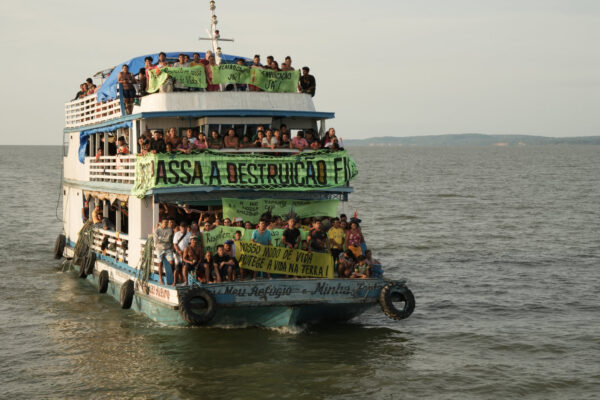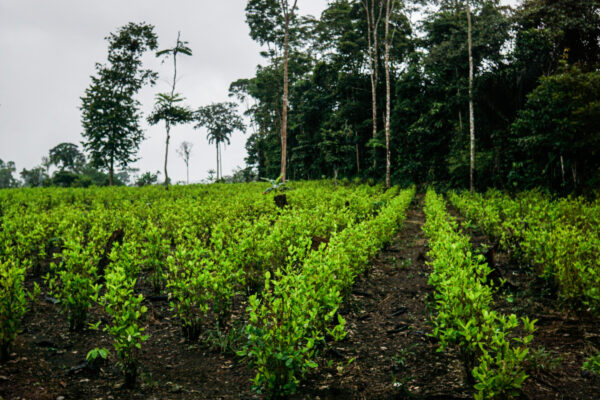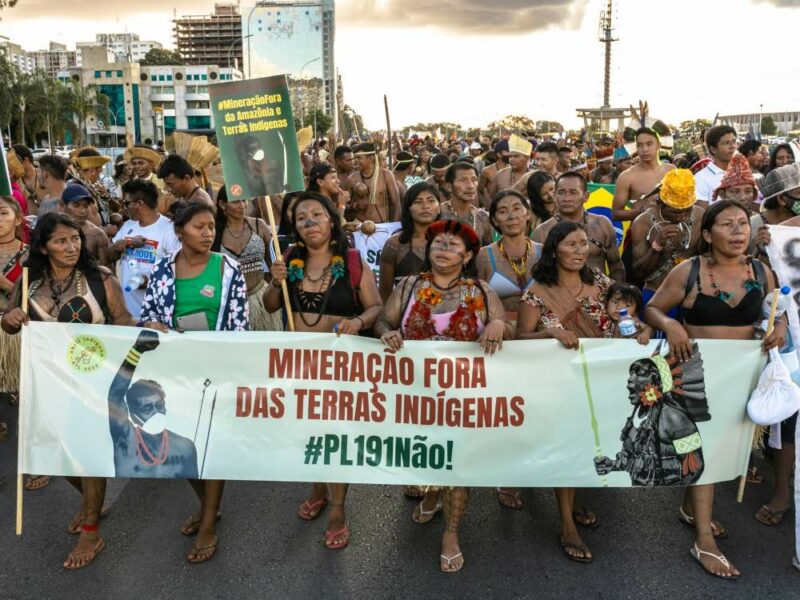In our Complicity in Destruction III report published in October 2020, the Association of Brazil’s Indigenous Peoples (APIB) alongside Amazon Watch, exposed the pressure that large mining companies have exerted on Indigenous lands (TIs), fueled by Bolsonaro’s efforts to open Indigenous territories to industrial mining. Among the case studies in the report, we highlight the hundreds of requests filed by Anglo American to prospect for minerals in concessions that overlap Indigenous lands, highlighting recent requests that threaten the territory of the Munduruku people.
Last week, the Resistance Assembly of the Munduruku People met to discuss urgent threats to Munduruku territory and define resistance strategies. With the presence of 200 participants from 47 villages, the assembly produced a powerful declaration that demands recognition of the Munduruku’s rights to life and territory. Both illegal “wildcat” and industrial mining were among the principal threats identified by the Munduruku, given the immense impact of illegal mining, and the destructive intentions of large mining companies coveting their territory, such as Anglo American.
“In the Middle Tapajós basin, there has been a rise in the number of barges loaded with soy, gas, and petroleum; grain port projects on the river (trans-shipment stations); the so-called Ferrogrão grain railway project; the advance of illegal logging operations and palm harvesters; and a growing number of gold dredges [that scour and mine the riverbed]. Corporations such as Anglo American and financial institutions such as BlackRock, are sponsoring this destruction.
(…) This would be made worse by the approval of the ‘Death Bill’ or Proposed Law (PL) 191/2020, which would open Indigenous Territories to industrial activities, such as mining. We, the majority of the Munduruku people, are against this law. We want our territory free from mining and all activities that cause destruction, environmental and social impacts – all of which are detrimental to the way of life of indigenous peoples,” affirms the Munduruku declaration.
In this context, we feel the need to reaffirm our commitment to the defense of Munduruku territory, and to clarify information sent to us by the company regarding the aforementioned requirements.
In its response to the Business and Human Rights Resource Center about the information provided in our report, Anglo American stated that it had given up all requests for mineral exploration in areas located on Indigenous lands in Brazil and that it had been in contact with Brazil’s National Mining Agency (ANM) to update their database. However, a recent report from InfoAmazônia news agency revealed that Brazil’s National Mining Agency (ANM) granted 27 permits for Anglo American to prospect copper within Indigenous lands in the states of Mato Grosso and Pará, with emphasis on the Munduruku’s Sawré Muybu Indigenous territory in Pará state, where it has made thirteen such requests. The ANM’s survey considered only the requests for prospecting concessions that were current on November 10, 2020, which indicates that the company must clarify why public records still do not reflect its intention to have these requests removed.
Anglo American also stated in its response that it has no plans to carry out any activities related to mining on Indigenous lands in Brazil and that all of their mining activities follow the internationally recognized principle of Free, Prior, and Informed Consent (FPIC) with affected communities, regardless of the provisions of local legislation.
While the commitment reaffirmed by Anglo American regarding prior consent from affected communities is important, it is essential to stress that there is still no legal basis for mining on Brazilian Indigenous lands. TIs are protected by the Brazilian Constitution, and current attempts to change this regulatory framework represent a major threat to the rights of Indigenous peoples, to the integrity of their territories – which remain barriers against deforestation and the degradation of Brazilian biomes – and to the ecological and climatic balance resulting from the protection of Indigenous lands, particularly in the Amazon.
Despite the importance of FPIC processes, they can be markedly asymmetrical and unfavorable to Indigenous communities, and cannot replace Brazil’s constitutional guarantees protecting Indigenous lands from industrial activities such as mining, which have a high potential for destructive impacts.
Therefore, we invite Anglo American to go further and make a public commitment to refrain from carrying out any mining activities on Indigenous lands in Brazil, regardless of changes in Brazilian legislation, in line with its human rights and biodiversity protection commitments, in particular the Declaration of ICMM’s position on Mining and Protected Areas. Indigenous blood: not a single drop more!













